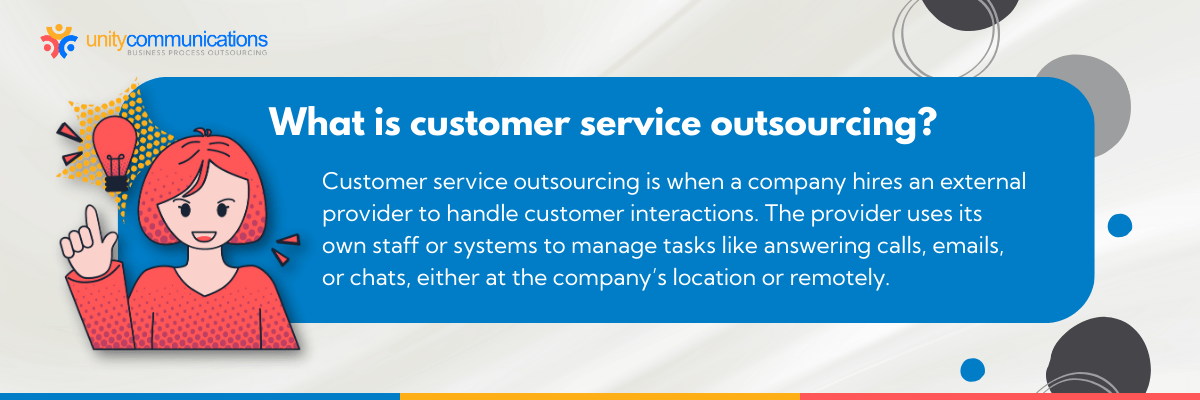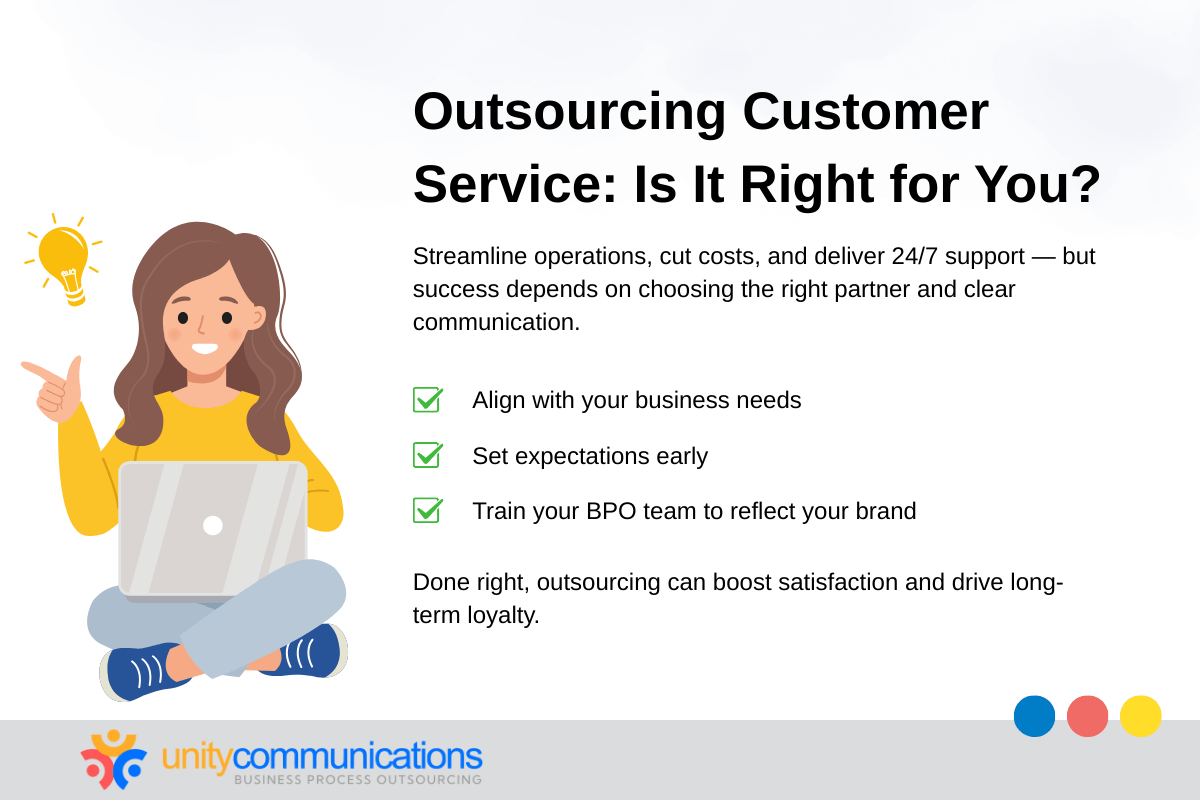IN THIS ARTICLE
Table of Contents
Delivering exceptional customer service is more important than ever to retain customers and improve the bottom line. However, managing an in-house support team can be costly, time-consuming, and resource-intensive.
That’s why many companies turn to business process outsourcing (BPO) for customer service—a strategy that not only cuts costs but also enhances operational efficiency. Outsourcing customer service through a BPO provider has become a common approach, but is it the right fit for your company? Let’s explore the pros and cons and what to consider before making the call.
What is customer service outsourcing?

Customer service outsourcing is the process of transferring the management of customer-facing communication channels to a third-party vendor. The outside service provider organizes its employees or computer systems to take over the workflow or services on-premises (within the hiring company’s facility) or at external locations.
Before, companies delegated customer service to a dedicated call center facility that trained their agents to handle inbound and outbound calls. Today, BPO teams can scale and manage other complex tasks, such as information technology (IT) or accounting.
You can also pursue contractual partnerships with a large third-party service provider or hire temporary office staff, freelancers, and individual contractors.
This flexibility means anyone, from Fortune 500 companies to small-sized businesses, can use outsourcing. Industry reports support the demand. Mordor Intelligence revealed that the customer service outsourcing market size could be worth $117.52 billion in 2025.
What are the reasons for outsourcing customer service?
Reports show that most businesses outsource to save on costs and boost their productivity and efficiency. Because a BPO provider focuses on only a particular task, they can complete the work better, faster, and more affordably than an in-house team.
Meanwhile, your in-house team can redirect available resources, such as savings, to other high-impact activities that increase your market competitiveness and profitability.
Some companies outsource customer support for other reasons. For instance, they might be incapable of hiring full-time, in-house employees, or the job might require more technical workers. Others work with third-party providers to transfer regulatory obligations to them.
Lastly, some businesses want to leverage a BPO team’s innovation, expertise, and industry insights to enhance customer experiences and automate workflows.
Indicators that you need to outsource customer service

Now that you know what BPO is for customer service, when is the best time to start outsourcing customer service?
This usually occurs when call volumes are high and wait times are long. These two issues can overburden an in-house team struggling to keep up with customer inquiries and frustrate customers, increasing the risk of losing them to competitors.
Other indicators that you need scalable support include the following:
- Inconsistent customer experience. If your customers receive varying service levels due to staffing shortages or inconsistent training, a dedicated BPO provider can standardize the experience.
- Limited multichannel support. Modern customers expect support via phone, email, chat, and social media. If your business lacks the resources to manage all these channels effectively, outsourcing can help fill the gap with omnichannel customer service.
- Difficulty in scaling operations. If your business experiences seasonal spikes or rapid growth, outsourcing can scale customer support without the hassle of hiring and training new employees.
- Low customer satisfaction scores. If surveys and feedback indicate declining satisfaction due to slow response times or poor service quality, a specialized BPO provider can help improve performance.
- Rising operating costs. Maintaining an in-house customer service team can be expensive due to salaries, benefits, training, and infrastructure costs. Customer service outsourcing might be more cost-effective.
- Lack of constant availability. Reports show that over 60% of consumers want 24/7 customer support. If you cannot provide it in-house, outsourcing to a provider with round-the-clock availability enhances customer satisfaction.
- Focus on core business functions. If managing customer support takes time and resources away from strategic business initiatives, customer service outsourcing allows your team to focus on growth and innovation.
- Language or geographic limitations. If your consumer base is global but your team lacks multilingual support or cultural expertise, customer service outsourcing can bridge communication gaps.
- Frequent agent turnover. High employee turnover leads to inconsistent service and increased training costs. Outsourcing to a stable, experienced provider ensures continuity and reliability.
- Compliance and security concerns. Healthcare, finance, and e-commerce industries must adhere to strict regulatory and data security standards. If your company lacks the expertise to manage these requirements, outsourcing to a BPO with compliance certifications can help.
If your business is experiencing any of these challenges, customer service outsourcing can address these problems, enhance efficiency, improve customer satisfaction, and optimize costs.
Pros and cons of outsourcing customer support
As a business, you should provide quality customer service to keep up with growing market demand, remain competitive, attract more customers, and improve the bottom line. But should you outsource customer service to achieve these goals?
Decide properly by understanding outsourcing customer service pros and cons:
Advantages of customer service outsourcing
Consider delegating customer service if you want the following benefits:
1. Decreased workload
Some small-business employees juggle many responsibilities, and they cannot immediately answer customer questions and concerns. Others feel the task takes time away from more high-value activities, such as sales. These problems can lead to delayed responses, frustrated customers, and missed business opportunities.
Customer service outsourcing frees up valuable resources, including time to drive more sales, follow up on profitable leads, and maintain lucrative accounts. This approach enhances customer satisfaction and loyalty and allows your employees to focus on strategic growth.
2. Cost savings
Hiring third-party customer service teams eliminates the need to pay fixed salaries and employee benefits for in-house staff.
It also removes the burden of investing in costly equipment and office space. The cost of a single customer service setup, including computers, software, office furniture, and workspace, can easily exceed $3,000 per employee.
In addition to cost savings, your business can work with skilled professionals and use advanced technology without bloating the budget. BPO providers can quickly adjust support teams based on demand.
Outsourcing can significantly reduce operating and labor expenses by up to 70% while ensuring you have a capable team to deliver consistent, high-quality service regardless of market demand.
3. Comprehensive customer support
Outsourcing customer service is a wise business decision if your customers need 24/7 support for troubleshooting, placing orders, or seeking product information.
A third-party customer support team can:
- Ensure customers receive help anytime, regardless of time zones or business hours.
- Handle inquiries via phone, email, live chat, and social media for a seamless customer experience.
- Reduce wait times and resolve issues quickly with dedicated agents.
- Use chatbots, customer relationship management (CRM) systems, and analytics tools to refine customer service.
- Train agents on brand voice, policies, and best practices to maintain high service standards and boost productivity.
- Provide multilingual assistance to serve a diverse customer base.
- Scale operations quickly to handle seasonal demand or business growth.
- Offer specialized support, such as technical assistance or industry-specific expertise.
- Improve cost efficiency by reducing overhead expenses associated with in-house teams.
- Gather customer insights through data tracking and reporting to enhance decision-making and service improvements.
By offering uninterrupted support, outsourcing enhances brand credibility, strengthens customer relationships, allows you to expand globally, and keeps your audience engaged.
Cons of outsourcing customer service
Despite the benefits of outsourcing customer service, it still comes with challenges and risks you should address to avoid costly mistakes and provide a more seamless customer experience.
Here are the cons of customer service outsourcing:
1. Lower customer satisfaction rate
You might worry that outsourcing customer service will result in losing the personal touch, increasing dissatisfied customers, and causing churn. For example, a loyal customer might feel frustrated when receiving generic, scripted email responses.
Selecting a reliable outsourcing partner with a proven track record of delivering high-quality customer interactions can resolve this problem. Thoroughly research their history, industry experience, and client testimonials to determine whether they align with your brand values and can meet service expectations.
Request references from existing or past clients to gain valuable insights into their team performance, responsiveness, and professionalism.
2. Lack of branding knowledge
Sometimes, your outsourced customer service representatives are less knowledgeable about your brand than in-house employees. As a result, they might be incapable of delivering the same expertise and personalized service.
Without proper training and continuous updates, external agents can struggle to address complex inquiries, resolve issues efficiently, or uphold the company’s unique voice and values.
A tip for outsourcing customer service is to communicate consistently with your team. Regular training sessions, detailed brand guidelines, and access to updated knowledge bases can help agents stay informed.
Additionally, provide real-time updates on new product launches, pricing, and policy revisions. Feedback loops, such as customer satisfaction surveys and performance reviews, can identify areas for improvement so the outsourced team can deliver a seamless and high-quality customer experience.
3. Not top priority
BPO agents sometimes handle multiple accounts simultaneously, switching between different industries and customer concerns throughout their shifts. One moment, they might assist a beauty retailer, and on the next call, they might answer an accounting or tech support question.
Although outsourcing provides cost efficiency and scalability, it also means that agents might not prioritize your business. For better focus and brand alignment, hire dedicated agents. They could quickly deepen their product knowledge, improve customer engagement, and provide a seamless brand experience.
However, exclusive agents can be costly. The right way to outsource customer service is to assess your business’s unique needs, determine whether shared or dedicated agents are a better fit, and choose a BPO partner that aligns with your brand values and customer expectations.
4. Security concerns
Certain businesses require exchanging highly sensitive personal information, including customer names, addresses, credit card numbers, and other confidential data. This increases the risks of breaches and other cybersecurity threats that can result in legal penalties, financial losses, and reputational damage.
Most reputable BPO companies implement multiple layers of security, including firewalls, secure networks, two-factor authentication, and non-disclosure agreements (NDAs) with employees to safeguard customer data.
However, you can do your part in prioritizing security when hiring a third-party customer service team, especially if your business deals with sensitive data and strict industry regulations:
- Conduct due diligence to vet potential outsourcing partners’ security measures.
- Ask about their compliance with industry standards for information security management. Do they have certifications, such as ISO 27001?
- Determine their encryption methods, secure payment processing, data access restrictions, and employee training programs on cybersecurity.
- Know whether they conduct regular security audits, monitor for potential breaches, and have contingency plans in case of a cyberattack.
- Review their data retention and disposal policies to ensure they do not store sensitive information longer than necessary.
- Verify their physical security measures, such as secured office locations, surveillance, and restricted access areas.
- Assess their incident response plan to understand how they handle data breaches and other security crises.
The cost of customer service outsourcing

The cost of outsourcing customer service to a third-party call center depends on the service you need. Basic answering services range from $0.80 to $1.17 per minute. A dedicated call center staff will cost around $25 per hour.
However, pricing structures can vary based on the agent’s expertise, language requirements, time zone coverage, and service availability, such as 24/7 support.
The price usually covers the following:
- Employee training to keep agents well-versed in company policies, products, and customer service best practices
- Agents’ salaries and benefits covering wages, performance incentives, and additional benefits to maintain workforce motivation
- IT infrastructure and other work-related tools such as CRM software, call routing systems, and clod-based support platforms
- Data analytics, tracking of key performance indicators (KPIs), and reporting to optimize efficiency and customer satisfaction
- Administrative maintenance for HR, compliance, and workforce scheduling
- Other technical and operational needs that provide cybersecurity measures, quality assurance, and multilingual support options
Pricing can fluctuate based on whether the outsourced team is built from scratch to meet specific business needs or if an existing team is available to begin operations immediately. When forming a new team, an initial setup that includes recruiting, training, and onboarding agents is necessary.
You can also choose between hiring shared or dedicated agents:
- Shared agents can handle general inquiries, live responses, and message-taking services. Since they serve multiple clients, their time is split between different businesses, reducing costs.
- Dedicated agents are typically more expensive but provide higher-value services, including customer retention strategies, complaint resolution, cold calling, and personalized support. They work exclusively for one company, gaining deeper brand familiarity and delivering a more personalized customer experience.
Ultimately, you should weigh your budget, service complexity, and customer engagement needs when deciding between shared and dedicated call center solutions.
Importance of outsourcing customer service the right way
Driving repeat conversions is essential to long-term business success. Returning customers tend to spend 67% more than first-time buyers.
Exceptional customer service fosters loyalty by creating a smooth and enjoyable experience. However, maintaining this level of service in-house can be challenging. Outsourcing becomes a strategic solution for providing consistent, high-quality support and optimizing resources.
Yet outsourcing goes beyond meeting service-level agreements. It thrives on strong, strategic partnerships, trust, and long-term collaboration.
Although termination clauses are important, setting clear expectations and cultivating accountability throughout the partnership is even more critical. Outsourcing relationships become more stable and prosperous when all parties uphold their commitments from the start.
The bottom line

Outsourcing customer service can be a game-changer for businesses looking to enhance efficiency, reduce costs, and provide round-the-clock support. Although service quality, security, and brand alignment concerns are valid, choosing the right partner and implementing clear communication strategies can mitigate these risks.
Assessing your business needs, setting clear expectations, and ensuring your well-trained BPO team can create a seamless customer experience that enhances satisfaction and loyalty.
Do you want to grow your business with customer service outsourcing? Let’s connect!





